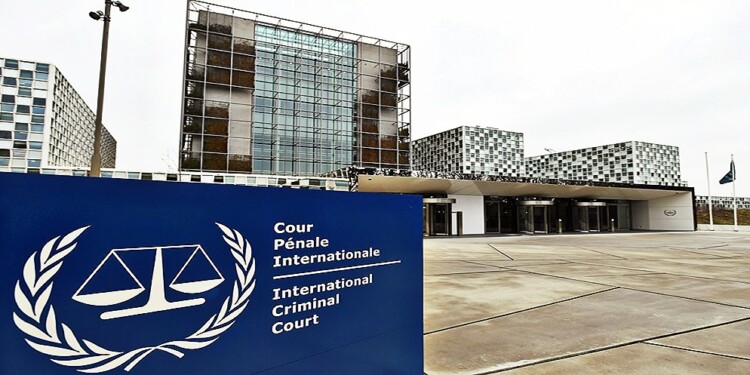Updated April 19. The Chief Prosecutor at the International Criminal Court (ICC) has declared Ukraine a “crime scene” and said there are “reasonable grounds” to believe war crimes have been committed after hundreds of bodies were recovered in Bucha following the retreat of Russian troops.
This statement is significant in that it reflects the authority of the ICC to conduct its own investigations into genocide, war crimes, crimes against humanity and the crime of aggression.
U.S. President Biden recently explicitly stated that Vladimir Putin was guilty of genocide. The implications of his doing so are very significant. But bringing Mr. Putin to the bar, actually prosecuting his horrendous criminal acts, holding a trial, convicting him if charges are proven, and then imposing justice, is a very far reach—leastways as things stand today.
International justice is highly complex, whether in dealing with a country or an individual. As explained in a previous Impakter article, relatively few ICC cases have gotten as far as a trial and punishment rendered. Because of its difficult birth and checkered history, the ICC is not supported by the whole international community: the UN Security Council Big Five – countries with a permanent seat and veto power – are divided; on one side the UK and France support the ICC, on the other side the US, Russia and China don’t.
It is difficult for laymen to navigate this landscape, so fraught with contradictory views by experts who spend their professional lives working in this field. What follows in this article is intended to provide some basic understanding of what the International Criminal Court (ICC) and the International Court of Justice (ICJ) are about, including their underlying instruments and institutions, past successes, and lack thereof.
What Is “Genocide”
First, a close look at the definition of the basic concept at issue here.
The term “genocide” was coined in 1943 by the Jewish-Polish lawyer Raphael Lemkin, who combined the Greek word “genos” (race or tribe) with the Latin word “cide” (to kill).
In the aftermath of World War II, the Convention on the Prevention and Punishment of the Crime of Genocide (Genocide Convention) was created in 1948 and came into force in 1951. This instrument codified for the first time the crime of genocide.
Article II of this Convention sets forth a narrower definition of the crime of genocide than is generally thought. It has two main elements:
- A mental element: the “intent to destroy, in whole or in part, a national, ethnical [sic], racial or religious group, as such”; and
- A physical element that includes any of the following five acts:
-
- Killing members of the group;
- Causing serious bodily or mental harm to members of the group;
- Deliberately inflicting on the group conditions of life calculated to bring about its physical destruction in whole or in part;
- imposing measures intended to prevent births within the group;
- Forcibly transferring children of the group to another group.
All member states of the United Nations by definition accept the Convention and are obligated, in theory, to take action to prevent and punish genocide wherever it occurs. Key International Agreements: The ICJ and ICC
The United Nations Charter established the International Court of Justice (ICJ) in June 1945 and began its work in April 1946. As an integral part of the United Nations, it is its primary judicial branch.
It is fundamentally a civil court to hear disputes between its member States when requested; resolve disputes concerning the interpretation of international law, and provide advisory opinions on legal matters to the organs of the UN’s specialized agencies. The UN Security Council enforces the rulings and judgments passed by this court.
The Rome Statute of 1998 created the ICC, independent of the United Nations. Unlike the ICJ, the ICC can try only individuals. Its aim is to determine crimes of the grossest and most serious atrocity (genocide, war crimes, crimes against humanity, and aggression).
An important but limiting point: The ICC has jurisdiction only when an accused is a national of a signatory state; if the crime took place in the territory of a signatory; or when the UN Security Council refers a situation to it – and this is where the role of the Big Five is crucial: Anyone of them can with a simple veto prevent a case from going to the ICC.
ICC judges can sentence a person up to 30 years imprisonment and in exceptional circumstances, a life sentence.
There are 123 countries that are ICC members including many western democracies. There are many non-members, significantly, as mentioned above, the three superpowers: the People’s Republic of China, Russia, and the United States.
America’s relationship with the ICC was complex and suffered setbacks. In 2000 President Clinton signed the Rome Statute but never submitted it to the Senate for its advice and consent; his successor, George W. Bush, notified the UN Secretary-General that the U.S. would not ratify the Rome Statute and explicitly did not recognize any obligations under it; President Obama’s administration was prepared to cooperate with the ICC; President Trump said the ICC had no legitimacy, and revoked the ICC Prosecutor’s visa to the U.S., anticipating a possible investigation into war crimes by U.S forces during the Afghanistan War. His onetime national security advisor, John Bolton recently wrote an Op-Ed strongly reiterating opposition to the ICC.
Now the Biden Administration is leading the call for a genocide prosecution. And while the US will not join the ICC, it can provide the ICC prosecutor with intelligence and “detail personnel for an ICC investigation or prosecution of a foreign national as long as the support was “case-specific” rather than institutional.” In short, it can cooperate and help build up the court’s legitimacy.
This type of cooperation has a past history. For example, the ICC conducted an investigation of an ICC member, the United Kingdom, as to British forces’ alleged war crimes during the Iraq conflict and occupation. An investigation however does not necessarily lead to prosecution, and in this particular case, the ICC Prosecutor decided not to pursue a formal prosecution.
Examples of recent genocide actions taken by the ICJ and ICC
Here are a couple of recent relevant examples.
ICJ: The Rohingya Genocide case. In 2019, The Gambia filed a case accusing Myanmar of violating the Genocide Convention and, in its application, requested the Court to issue provisional measures in order “to protect against further, irreparable harm to the rights of the Rohingya group.”
The ICJ ordered Myanmar to prevent genocidal acts generally, to ensure that its military and police forces do not commit genocidal acts, to preserve all evidence of genocidal acts, and to report back to the court on compliance with these measures.
The Court then issued procedural orders setting filing dates for the two parties, with an extension granted in mid-2021 to Myanmar; thus, any final decision remains pending.
ICC: Darfur, Sudan case. The UN Security Council requested the ICC to investigate allegations of genocide, war crimes, and crimes against humanity committed in Darfur, Sudan, since July 2002.
This Darfur situation was the first to be referred to the ICC by the Security Council, and the first ICC investigation on the territory of a non-State Party to the Rome Statute. It was the first ICC investigation dealing with allegations of the crime of genocide.
Sudan’s then President, Omar Al Bashir, was the first sitting President to be wanted by the ICC, and the first person to be charged by the ICC for the crime of genocide.
Neither of the two warrants for his arrest has been enforced, he is not currently in the Court’s custody, and cannot be tried in absentia.
ICC Strengths and Weaknesses
In theory, under its existing authorities, the ICC would be the appropriate existing forum to conduct a full-blown investigation and genocide prosecution relating to the ongoing Russian invasion of Ukraine and specifically Vladimir Putin and others.
However, genocide cases are very hard to undertake and bring to trial because they require an especially high burden of proof, showing that the defendants committed those “physical act or acts” specified in the definition, and with the intent to do harm.
Recently the ICC Chief Prosecutor has taken an initial step by initiating an investigation into the apparent massacres in Bucha, but it remains to be seen how much further the ICC will be able to go, given that Russia is not a signatory.
The ICC has both supporters and detractors, each with many reasons to hold its point of view. To gain a very minimal sense of what the debate is about, we can note the following:
Favorably disposed: The Rome Statute is, itself, a major development in international law. The ICC prosecution service is independent in the carrying out of its function and has the power to initiate investigations even if the countries that have not ratified the Rome Statute and the UN Security Council are reluctant to do so.
Critics: The ICC is constrained in the extent to which it can bring nationals of non-member States to trial, much less convict and imprison them. It does not have sufficient instruments, such as subpoena powers. essential in many legal systems to make a case.
One alternative could be to create a special court or tribunal to deal with the Ukraine situation. And there are models to do so, beginning with the Nuremberg and Tokyo trials after World War II, and more recently with the ad hoc tribunals for Yugoslavia (described below) and Rwanda.
Alternative mechanisms: Ad hoc tribunals
As mentioned above, there are other ways to bring justice to war criminals, so-called ad hoc tribunals, notably the Special Court for Sierra Leone and the Special Tribunal for Lebanon. And the most recent example in the news today is the Special Criminal Court (SCC), located in Bangui, Central African Republic (CAR) which is opening its final hearings on April 19.
These courts are what is called by international lawyers “hybrid international courts”, i.e. they are similar to the ICC since they are given the mandate to try individuals accused of “serious violations of human rights and international humanitarian law”, including war crimes, crimes against humanity and genocide, but what changes is the “situation”: what specific crimes, when and where.
As these trials are still ongoing, here we take a look at a case that, since it is closed, it gives us an idea of what can be obtained from ad hoc tribunals.
International Criminal Tribunal for the former Yugoslavia The UN Security Council acting under Chapter VII of the UN Charter, and having determined earlier that the situation was a threat to international peace and security, adopted Resolution 827 to formally establish the International Criminal Tribunal for the former Yugoslavia (ICTY).
The ICTY was a United Nations court of law that dealt with war crimes that took place during the conflicts in the Balkans in the 1990s.
A total of 160 individuals were indicted. The most famous, Radovan Karadzic was convicted of genocide who is serving a life sentence in a prison in the United Kingdom.
The creation of the ICTY and its processes arguably changed the landscape of international humanitarian law by providing an international tribunal in which victims could testify about the horrors – witnessed and experienced and bring those responsible to account.
Inasmuch as the culprits in Ukraine are nationals of a non-signatory state to the ICC and the said state – Russia – is a permanent member of the UN Security Council with veto power, this is not a model likely to gain much traction.
This article is an effort to provide an overview of existing international agreements and institutions, and an alternative path to seeking justice for the unspeakable crimes being committed.
The Russian invasion of Ukraine is unchartered territory in modern times. Rules that largely contained military confrontation in Europe no longer hold. In the days ahead, the collective global community will have to find new creative ways to prevent or contain genocide, war crimes, crimes against humanity, and crimes of aggression committed by a permanent member of the Security Council.
Editor’s Note: The opinions expressed here by Impakter.com columnists are their own, not those of Impakter.com — In the Featured Photo: ICC Headquarters Source: ICC org.










